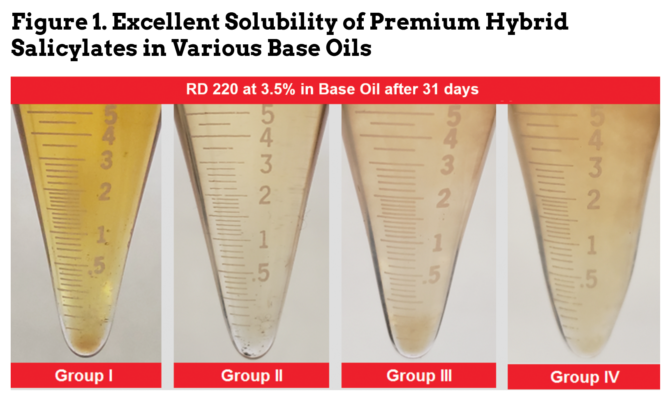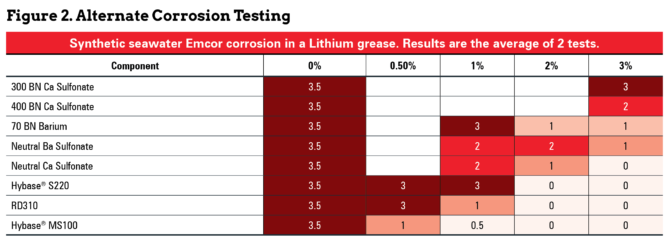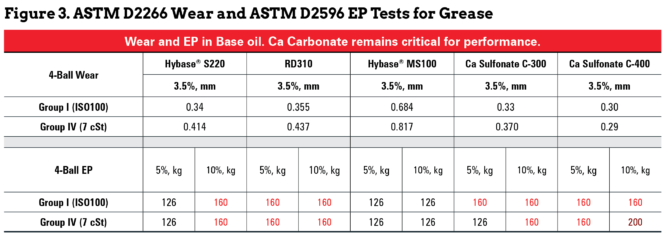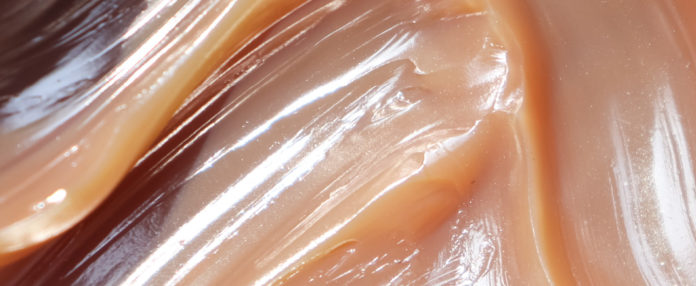Figures from the National Lubricating Grease Institute’s 2019 Annual Production Survey showed that although lithium remains the dominant thickener for grease, there are signs that its stranglehold may be starting to ease, albeit slowly.
While lithium is used as a thickener in about 70% of total global grease production, there has been a gradual decline in recent years. According to the NLGI report, conventional lithium soaps have accounted for most of this drop.
Conversely, alternatives such as anhydrous calcium and calcium sulfonate have seen increased production and uptake—particularly outside of North America—and that momentum appears to be building.
John Sander, vice president of research & development at Lubrication Engineers, said there has been a small but noticeable shift toward calcium-based greases over the past few years. “This is a fairly recent trend that I think is largely due to performance as well as the cost of lithium, which is beginning to climb. Combined, this is definitely making calcium grease products more attractive.”
He continued, “Calcium sulfonates, for example, can certainly compete with lithium complexes for more demanding, specialist, high-performance applications. In terms of their high dropping point, shear stability and oxidative resistance, the calcium soaps perform extremely well.”
Lithium has a long legacy in grease, while calcium sulfonate thickeners were first introduced to the market only a few decades ago and are relatively new to the scene.
In general, some types of calcium soaps are seen as having better attributes in greases than lithium, suggested Joe Kaperick, senior advisor for grease technology at Afton Chemical. “There has been an increase in the use of calcium sulfonate, but it’s still a relatively small piece of the market at only about 7% in North America and even lower globally. But we do see some signs of growth.”
Although there remains a seemingly seismic gap between the use of lithium and calcium soaps, this shift is perhaps not unexpected.
Competing Markets
In recent years, many have speculated that lithium would eventually start to relinquish its vice-like grip on the grease market given the ever-growing pull in demand from other sectors.
Its use in battery production for the increasingly popular electric vehicle, as well as in portable electronic devices such as cell phones and laptops, has been well publicized.
As a result of this, there have been suggestions that lithium availability could start to tighten and push up pricing, particularly as a new generation of greener vehicles become even more common on our roads.
Lithium suppliers, however, have long maintained that there is sufficient availability to comfortably meet the demands of both the grease and electric vehicle markets.
Price spikes are also fairly infrequent, the last significant surge in lithium pricing occurring around five years ago when India reported values seven times above normal levels.
Still, e-mobility continues to attract more interest from consumers, and governments across the globe have committed to ambitious emissions targets that will see gasoline and diesel cars phased out over the coming decade in favor of more efficient and environmentally friendly battery-powered alternatives.
The past few months have also seen a number of major vehicle manufacturers unveil plans to increase their foothold in this burgeoning market.
The long-term effect on grease production is unclear, but as this trend may inevitably draw lithium away from grease, players could increasingly look more toward other thickeners such as calcium soaps.
Although battery electric vehicles still represent only a small portion of the automotive sector, observers expect their share to grow exponentially over the coming years.
Roland Berger’s recently published E-Mobility Index 2021, now in its tenth year, shows that sales of electric vehicles have continued to perform well despite the rest of the automotive market suffering because of the ongoing COVID-19 pandemic. The report adds that United States cell production capacities are growing strongly and have now overtaken those of Japan and South Korea.
A Viable Alternative
Certainly calcium sulfonate greases are seen as an ideal replacement for lithium in many applications. Indeed, in many circumstances their use may even be preferable given their high levels of performance and suitability for H-1 food-grade and marine use.
Many may also opt for calcium soaps because of their natural corrosion resistance properties, for example. To reach those same levels of performance with lithium in terms of corrosion prevention or anti-wear, additives are often required.
Calcium sulfonate greases boast high dropping points and good extreme pressure properties, and are suited to the stresses of demanding environments. Polymer can also be added as part of the grease-making process to increase lubricity and water tolerance, for example.
Kaperick pointed out, however, that calcium sulfonate soaps require more thickener, and this can have some downsides.
To achieve the same consistency of grease with a calcium sulfonate, around 30%-35% thickener is used versus only about 7%-8% thickener in a simple lithium grease, or 10%-15% for lithium complex.
This not only means that lithium is far easier to pump in lower temperatures, but the extra thickener required with calcium greases also affects affordability.
“However, as machinery and applications get more demanding, maybe people are starting to realize that lithium isn’t always the best option,” Kaperick said. “They may be willing to pay a little bit more for a calcium sulfonate grease because it gives them better EP and high-temperature performance, as well as corrosion protection.”
He continued, “Right now, I’m not sure we’re at a tipping point. Lithium is still a very good multipurpose grease for a reasonable price and that’s not going to change anytime soon—but calcium sulfonate certainly has some room to grow, and I would expect it to continue to grow slowly over the next 10 to 20 years.”
In this Spotlight, LANXESS discusses its patented hybrid salicylate grease technology.

Hybrid Salicylates Provide Peak Performance in Lubricating Grease
With increasingly demanding applications calling for outstanding greases, LANXESS has added Hybrid Salicylates to its portfolio—a patented novel technology that reacts overbased sulfonates with custom designed alkyl salicylic acids.
The development of this new range of Premium Hybrid Salicylates (PHS) offers multifunctional performance to both lubricants and greases, with excellent wear and extreme pressure properties, as well as superior corrosion resistance.
These products include Hybase® S220, an overbased calcium product with a base number (BN) of 220, and Hybase® MS100, an overbased magnesium hybrid salicylate with a 100 BN. Another calcium product, RD310, is currently in development and has an even higher BN of 350.
Each of these products is proven to have exceptional performance in terms of detergency, oxidation resistance, ashphaltenes handling, corrosion resistance, as well as anti-wear and EP properties. Although many of these attributes are common to the class of oil-soluble detergents, LANXESS’ Hybrid Salicylate technology offers far greater levels of performance.
This makes these truly multi-functional additives ideal for use in a wide range of applications including grease, marine, Passenger Car Motor Oil (PCMO), Heavy Duty Diesel Engine Oil (HDDEO), industrial, metalworking, and fuel.
Solubility in Base Oil and Grease
Before any performance can be adequately imparted to the grease, the hybrid salicylates must be completely soluble and stable in the grease. Extensive testing in a standard lithium grease showed no issues with fully incorporating the additive and no stability issues afterwards.
Thorough tests were carried out in a range of base oil types at temperatures from -5˚C to 60˚C. All of the premium hybrid salicylates were found to be fully soluble in a range of base oils including Group I, II, III and IV. As these products are based on calcium and magnesium sulfonates, they had similarly great solubility as the straight sulfonates (Figure 1).

Corrosion Protection in Grease
Most grease types have minimal corrosion resistance and therefore require additives. There are several types of additives available, but among the most common are neutral and overbased calcium sulfonates.
As has been shown in oil-based lubricant testing, LANXESS Hybrid Salicylates have exceptional corrosion resistance over similar sulfonates or salicylates. There is clearly synergy present by combining the two technologies, as is demonstrated during testing in a lithium grease.
The ASTM D6138 Emcor dynamic bearing corrosion test, widely accepted in the industry, was employed using synthetic seawater. The results showed that the PHS products all outperformed the test standards and even exceeded those set by barium sulfonates, the benchmark for corrosion resistance.

LANXESS Hybase® MS100 was proven to be the best overall corrosion inhibitor, closely followed by Hybase® S220 and RD310 (Figure 2). Although not displayed in the chart, the hybrid salicylates are even effective at boosting the corrosion resistance of calcium sulfonate complex grease in extreme corrosion environments.
Wear and EP Properties
LANXESS calcium PHS products are shown, in all base oil types, to have similar wear and EP properties to those of standard calcium sulfonates. In sulfonates, the excess calcium carbonate is recognized as an excellent lubricity agent. That same carbonate is present in our PHS products.
Hybase® MS100 is not as effective in terms of either wear or EP, and there are several reasons for this. Magnesium carbonate is not as good a lubricant as calcium carbonate because it is slightly harder on the MOHS hardness scale. Also, the level of carbonate in Hybase® MS100 is much lower than the calcium carbonate levels in the others.
In addition to the general EP properties provided by calcium carbonate, it is widely recognized that the combination of an active sulfur compound and an overbased calcium sulfonate can synergistically boost EP performance to very high levels.
A similar study in base oil has shown that the same synergy may be present between an active sulfur compound and our calcium PHS (Figures 3 and 4).


Extensive research and testing highlight that LANXESS Premium Hybrid Salicylates clearly have the potential to offer multifunctional performance, not only to lubricants but to grease as well.
They boast superior wear and EP performance, and like overbased sulfonates, may act synergistically with active sulfur compounds for EP performance.
Most critically to the grease formulator, they also have the potential to offer superior corrosion resistance performance to their important grease formulations.
If multiple performance properties are required, then LANXESS’ calcium-based premium hybrid salicylates are the preferred option—but if corrosion resistance is the most important factor for the application, then Hybase® MS100 may be the best choice.
To find out more about LANXESS Hybrid Salicylates, their benefits and applications, visit https://lanxess.com/en/Company/Corporate-Structure/Business-Units/Lubricant-Additives-Business
The information and data referred to in the foregoing article is intended for technical consideration only and is given in good faith and believed to be accurate, but LANXESS does not represent, warrant or otherwise guarantee, expressly or implied, the merchantability, fitness for a particular purpose, freedom from patent infringement, suitability, accuracy, reliability, or completeness of this information or the products, materials, processes and advice described herein. LANXESS expressly disclaims liability for any loss, damage or injury directly or indirectly suffered or incurred as a result of or related to anyone using or relying on any of the information and data in this article. ©2021 LANXESS AG., LANXESS and the LANXESS logo are trademarks of LANXESS Deutschland GmbH or its affiliates. The trademarks may be registered in many countries in the world.
